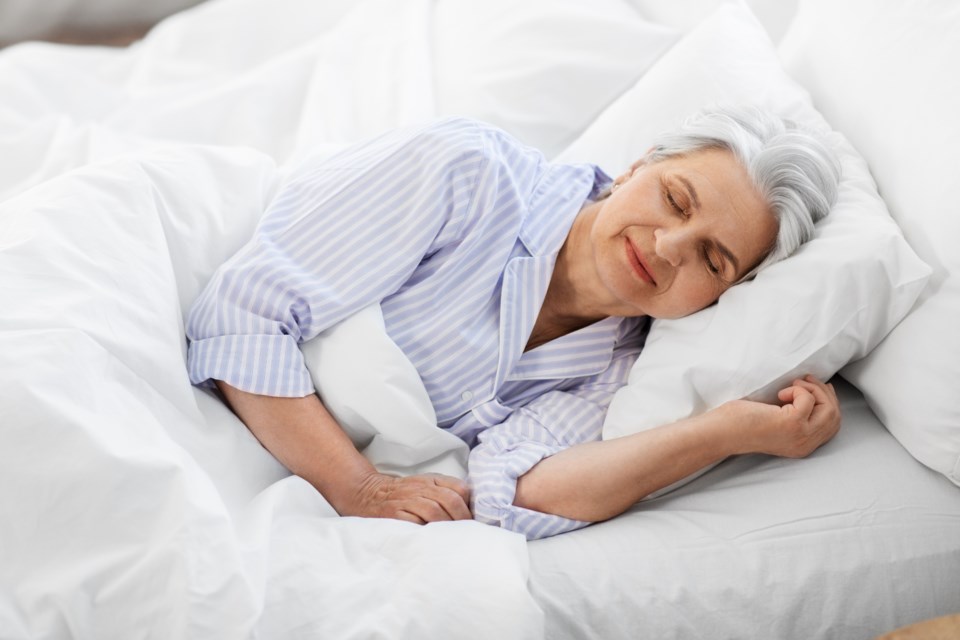For millions of Canadians, sleep disorders cast a long shadow over their lives, impacting their health, productivity, and overall well-being. According to the Canadian Sleep Society, approximately 40% of Canadians suffer some form of sleep disorder, with insomnia, sleep apnea, restless leg syndrome, and narcolepsy being the most common. Chantal Tremblay is a registered sleep expert in sleep data collection and analysis with extensive experience in this field and the owner of Northern Home Sleep Testing in Sudbury. Tremblay is the only home sleep tester in Northern Ontario. She says, “I find that sleep disorders are often underdiagnosed and undertreated. Most people are aware they have a sleep disorder, but they will not undergo testing in a sleep laboratory because of anxiety, mobility issues, or because they can’t take time off work for a 12-hour test.”
One of the most common reasons for sleep testing is to diagnose symptoms of obstructive sleep apnea, which include waking suddenly after a pause in breathing, excessive daytime sleepiness, loud snoring, morning headaches, and high blood pressure. Other reasons include a pre-operative assessment, CPAP renewal, or occupational health assessment.
Home Sleep Testing
There is an easier and more comfortable alternative to inconvenient overnight stays in a sleep lab. Tremblay says, “I’ve been in this field for 31 years and I’ve found a need for home testing in the Sudbury area. Home sleep testing is more private and not as invasive as the sleep testing conducted in a lab.”
The way it works is that Chantal Tremblay will prepare a package that a patient can pick up at her Sudbury home office. Inside, is a device about the size of a cell phone, which wraps around a sleep test patient’s chest. A finger probe will measure their oxygen level while a nasal cannula will measure respiration. Tremblay says, “It’s a take home test with only three sensors that need to be worn for one night in the comfort of your own bed. The device measures breathing patterns, breathing pauses, heavy snoring, dropping oxygen levels, racing heart rates, and restlessness. When the patient brings the device back, I download the data, analyze the test, create a report, and send it to a sleep specialist for interpretation.”
The patient is given a copy of the test, and the other copy is faxed to the patient’s healthcare provider. Tremblay says, “If they don’t have a family physician, I give the patient all the documentation to bring to a clinic in Sudbury to be completed by a physician. Then the patient can be referred to a sleep specialist if necessary.”
The report is available within a week and comes with a diagnosis and recommendations for treatment. Tremblay adds, “If patients have obstructive sleep apnea, I will identify that and the sleep specialist will categorize it into mild, moderate, severe or very severe.”
The cost of the Home Sleep Apnea Test or Level III study is currently $175 and is not covered by OHIP in Ontario, one of the few jurisdictions in Canada that does not cover the cost of the sleep test.
Next Steps
If the diagnosis is obstructive sleep apnea, there are two paths to acquiring a recommended CPAP machine. Tremblay says, “If the client can afford a CPAP machine for a cost of approximately $1500 then no further testing is needed, and they do not need to see a sleep specialist. They can take the home sleep test to their health care provider and if the physician writes a prescription for an Auto-CPAP unit, that’s all they need.”
However, if an individual cannot afford a CPAP machine, they will be triaged accordingly at the hospital and the patient must do another full sleep test at the hospital lab and then see a sleep specialist to fill out an Assistive Devices Program (ADP) form for coverage, which is about 75% covered. Some private insurance providers will cover the CPAP machine.
If an individual has moderate sleep apnea with bad snoring, they can get a Mandibular Advancement Device made by a dentist which will pull their jaw forward to stop the loud snoring. All the patient needs are a prescription from the healthcare provider and a copy of the home test.
“You changed my life”
In addition to the ease and convenience of the home sleep test, it can also help patients bypass the long wait times at the hospital sleep lab and depending on the diagnosis, it could accelerate the treatment process. Tremblay says, “It’s an easier path to a diagnosis for many patients who are relieved to move forward with treatment.” If left untreated, sleep apnea can increase the risk of stroke and heart problems.
Given that sleep apnea can be very debilitating, patients are comforted by a definitive diagnosis. Tremblay says, “Once sleep apnea is diagnosed, the patient will often call me back and say, ‘you’ve changed my life. This is so amazing.’ And they thank me for my service because the process moves quickly toward treatment.”
Chantal Tremblay, a Registered Polysomnographic Technologist, and a Registered Respiratory Therapist has more than three decades of experience in sleep medicine and is passionate about helping her patients. She says, “I find identifying sleep disorders and putting individuals on a path to treatment is extremely rewarding.”
Early detection and intervention are crucial in managing sleep disorders effectively and preventing long-term complications. Chantal Tremblay and Northern Home Sleep Testing offers individuals suffering with sleep deprivation a convenient testing solution in the comfort of their own home. By reducing barriers to diagnosis, Northern Home Sleep Testing empowers individuals to take control of their sleep health and seek appropriate treatment so they can enjoy the restorative benefits of a good night’s sleep and have hope for a brighter future.
Northern Home Sleep Testing provides service in both English and French. Contact Chantal Tremblay at Email: [email protected] or (705) 698-2892.
